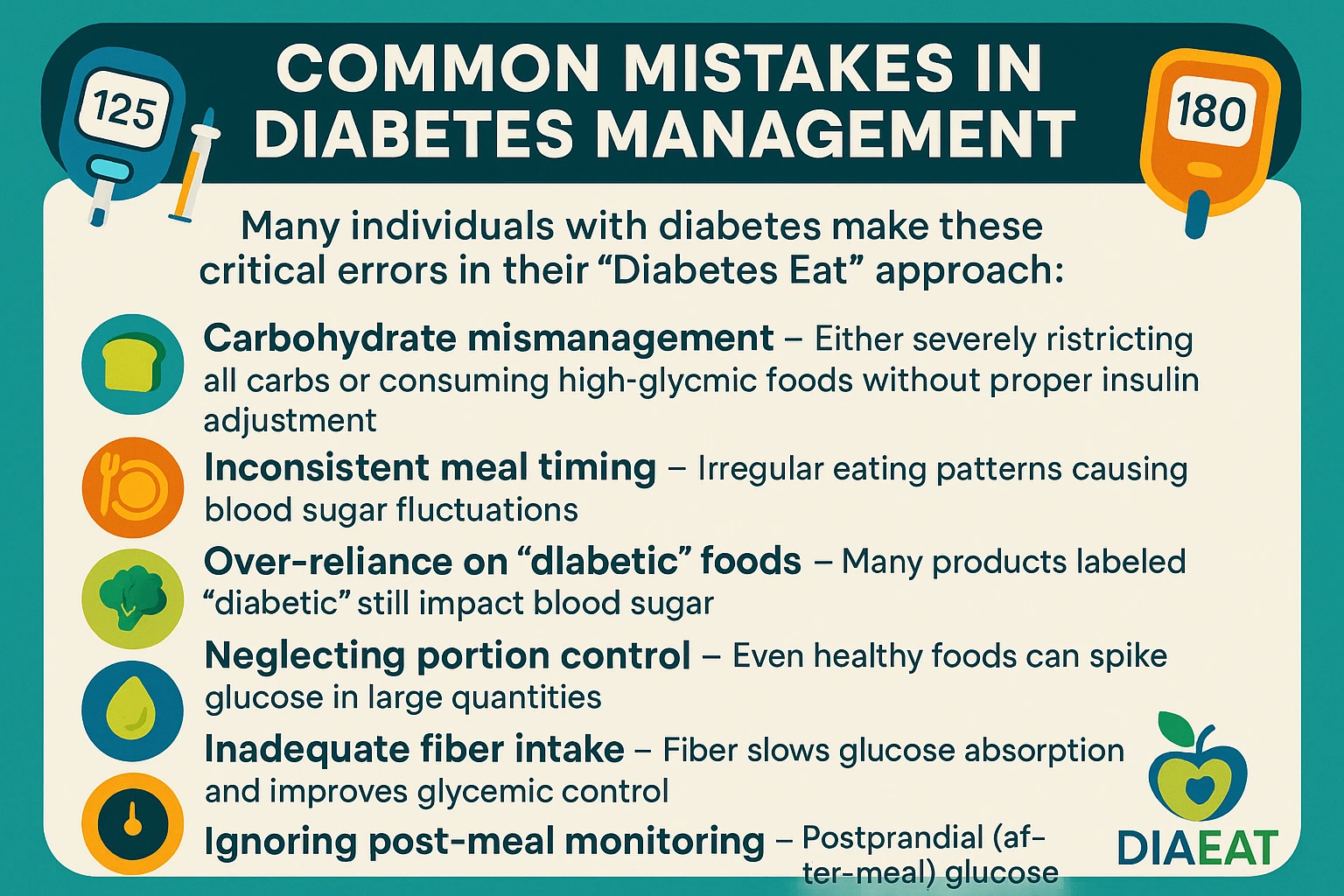Diabetes Eat: The Ultimate Guide to Managing Type 1 & Type 2 Diabetes Through Smart Nutrition

Key Takeaway: Proper “Diabetes Eat” strategies can help stabilize blood sugar, prevent complications, and improve quality of life for both Type 1 and Type 2 Diabetes patients. This comprehensive guide covers dietary approaches, medication options, monitoring tools, and lifestyle modifications backed by the latest research.
Understanding Diabetes: Type 1 vs Type 2
Diabetes mellitus is a chronic metabolic disorder characterized by elevated blood glucose levels (hyperglycemia) resulting from defects in insulin secretion, insulin action, or both. The two main forms are:
Type 2 Diabetes (T2D)
Accounting for 90-95% of all diabetes cases, Type 2 Diabetes (T2D) develops when the body becomes resistant to insulin or when the pancreas fails to produce enough insulin. Risk factors include obesity, physical inactivity, and genetic predisposition.
Type 1 Diabetes (T1D)
An autoimmune condition where the body’s immune system destroys insulin-producing beta cells in the pancreas, requiring lifelong insulin therapy. It typically develops in childhood or adolescence but can occur at any age.
Common Mistakes in Diabetes Management
Many individuals with diabetes make these critical errors in their “Diabetes Eat” approach:
- Carbohydrate mismanagement: Either severely restricting all carbs or consuming high-glycemic foods without proper insulin adjustment
- Inconsistent meal timing: Irregular eating patterns causing blood sugar fluctuations
- Over-reliance on “diabetic” foods: Many products labeled “diabetic” still impact blood sugar
- Neglecting portion control: Even healthy foods can spike glucose in large quantities
- Inadequate fiber intake: Fiber slows glucose absorption and improves glycemic control
- Ignoring post-meal monitoring: Postprandial (after-meal) glucose levels are crucial for HbA1c
Essential Diabetes Eat Strategies
Dietary Approaches
Several evidence-based eating patterns benefit diabetes management:
| Diet Type | Description | Benefits |
|---|---|---|
| Mediterranean | Rich in olive oil, fish, nuts, vegetables | Improves insulin sensitivity, reduces cardiovascular risk |
| Low Glycemic Index | Focuses on slow-digesting carbs | Prevents blood sugar spikes, better long-term control |
| DASH Diet | Emphasizes fruits, vegetables, low-fat dairy | Lowers blood pressure and improves metabolic markers |
| Modified Keto | Very low-carb, high healthy fats (under medical supervision) | May reduce insulin requirements, improve glycemic control |
Diabetes Monitoring Technology
| Device Type | Examples | Purpose |
|---|---|---|
| Continuous Glucose Monitors (CGMs) | Dexcom G6, Freestyle Libre | Real-time glucose tracking with alerts |
| Insulin Pumps | Omnipod, Tandem t:slim | Automated insulin delivery |
| Smart Pens | InPen, NovoPen Echo | Dose tracking and reminders |
| Hybrid Closed Loop Systems | Medtronic 780G | Combines CGM and pump for automated adjustments |
Top Diabetes Management Apps
| App Name | Platform | Key Features | Cost |
|---|---|---|---|
| mySugr | iOS/Android | Logbook, insulin calculator, reports | Freemium |
| Fooducate | iOS/Android | Food tracking with glycemic impact | Freemium |
| Glucose Buddy | iOS/Android | Blood sugar tracking with A1c prediction | Free |
| One Drop | iOS/Android | AI-powered coaching, CGM integration | Subscription |
| Diabetes:M | Android | Comprehensive management with cloud sync | Freemium |
| BeatO | iOS/Android | Indian-focused with doctor consultation | Freemium |
| Blood Glucose Tracker | iOS | Simple logging with Health app integration | Free |
| Klinio | iOS/Android | Personalized meal plans and exercise | Subscription |
Medication Options for Diabetes
Treatment varies by diabetes type and individual needs:
For Type 2 Diabetes (T2D)
- Metformin: First-line medication improving insulin sensitivity
- SGLT2 inhibitors: Reduce glucose reabsorption in kidneys
- GLP-1 receptor agonists: Stimulate insulin secretion, suppress glucagon
- DPP-4 inhibitors: Prolong action of incretin hormones
- Sulfonylureas: Stimulate pancreatic insulin production
For Type 1 Diabetes
- Rapid-acting insulin: Lispro, Aspart, Glulisine (mealtime)
- Long-acting insulin: Glargine, Detemir, Degludec (basal)
- Inhaled insulin: Afrezza for rapid correction
- Amylin analog: Pramlintide to slow gastric emptying
Exercise Recommendations
Physical activity improves insulin sensitivity and glycemic control:
- Aerobic exercise: 150 minutes/week moderate activity (brisk walking, swimming)
- Resistance training: 2-3 sessions/week targeting major muscle groups
- Flexibility/balance: Yoga or tai chi for 2-3 sessions weekly
- Interval training: Short bursts of high-intensity exercise with rest periods
Pro Tip: Always check blood glucose before, during, and after exercise. Keep fast-acting carbs available to treat potential hypoglycemia during prolonged activity.
Latest Research in Diabetes Management
Recent advancements in diabetes care include:
- Artificial pancreas systems: Hybrid closed-loop technology improving automated insulin delivery
- Smart insulin: Experimental insulin that activates only when blood sugar is high
- Microbiome therapies: Gut bacteria modification showing promise in Type 2 Diabetes (T2D) management
- Stem cell research: Potential for beta cell regeneration in Type 1 Diabetes
- Gene therapy: Early-stage research into genetic modifications to treat diabetes
Essential Resources for Diabetes Education
| Resource | Type | Link |
|---|---|---|
| American Diabetes Association | Organization | diabetes.org |
| Diabetes UK | Organization | diabetes.co.uk |
| NIH Diabetes Resources | Government | niddk.nih.gov |
| Diabetes Daily | Community | diabetesdaily.com |
| Beyond Type 1 | Advocacy | beyondtype1.org |
Conclusion: Mastering Diabetes Eat for Better Health
Effective diabetes management through “Diabetes Eat” strategies requires a comprehensive approach combining proper nutrition, medication adherence, regular monitoring, physical activity, and ongoing education. By understanding the differences between Type 1 and Type 2 Diabetes (T2D), utilizing modern technology, and avoiding common pitfalls, individuals with diabetes can achieve better glycemic control and reduce complication risks.
Remember that diabetes management is highly individualized. Work closely with your healthcare team to develop a personalized plan that addresses your specific needs, preferences, and lifestyle factors.
Final Recommendation: Bookmark diaeat.com for ongoing diabetes nutrition resources, meal plans, and the latest research updates to support your diabetes management journey.
References & Further Reading
